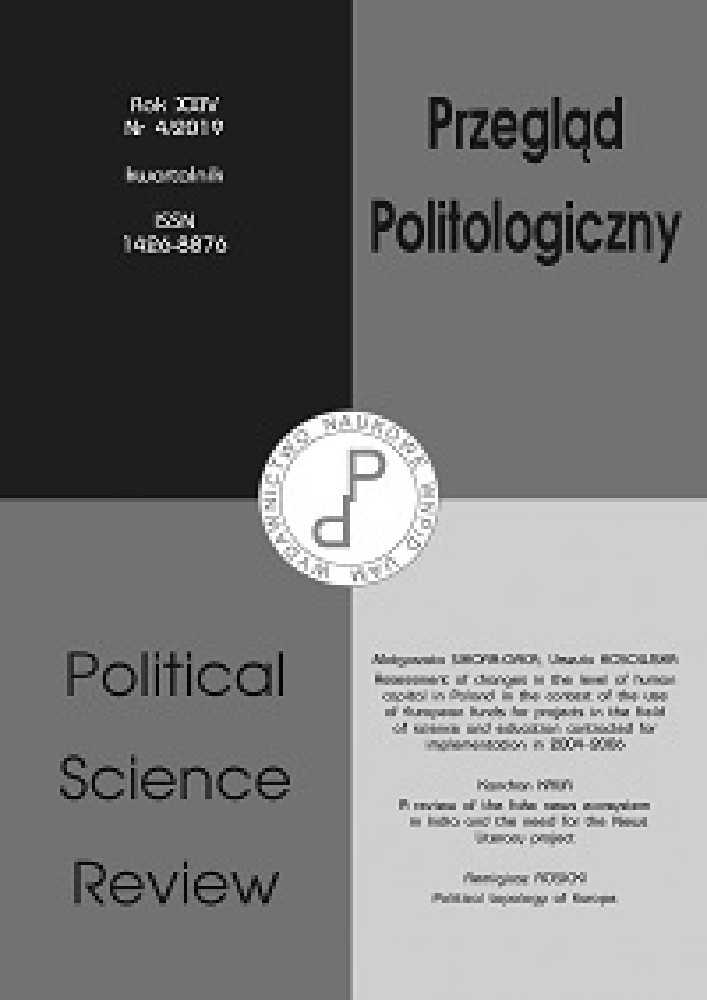Abstrakt
W artykule ukazano obecne w nauce o stosunkach międzynarodowych sposoby rozumienia miejsca indukcyjnego i dedukcyjnego wnioskowania w procesie budowania teorii i wiedzy o stosunkach międzynarodowych oraz wynikające z nich spory. Autor argumentuje, że w badaniu stosunków międzynarodowych, podobnie jak w naukach przyrodniczych, niezbędne jest łączenie empirycznej obserwacji z kreatywnym budowaniem teorii. Autor dokonuje krytycznej analizy stanowisk wybranych teoretyków stosunków międzynarodowych w kwestiach związanych z problemami indukcji i dedukcji oraz teoretyzowania stosunków międzynarodowych.
Bibliografia
Adler E. (1997), Seizing the Middle Ground: Constructivism in World Politics, “European Journal of International Relations”, vol. 3, no. 3.
Blagden D. (2016), Induction and Deduction in International Relations: Squaring the Circle Between Theory and Evidence, “International Studies Review”, vol. 18, no. 2.
Davidson D. (2000), Truth Rehabilitated, in: Rorty and His Critics (Philosophers and their Critics), ed. R. Brandom, Blackwell Publishing, Oxford.
Elman C., Elman M. F. (1997), Lakatos and Neorealism: A Reply to Vasquez, “American Political Science Review”, vol. 91, no. 4.
Elman C., Elman M. F. (eds.) (2003), Progress in International Relations Theory. Appraising the Field, MIT Press, Cambridge.
Farber H. S., Gowa J. (1995), Polities and Peace, “International Security”, vol. 20, no. 2.
George A. L., Bennett A. (2005), Case Studies and Theory Development in the Social Sciences, MIT Press, Cambridge.
Halliday F., Rosenberg J. (1998), Interview with Ken Waltz, “Review of International Studies”, vol. 24, no. 3.
Humphreys A. R. C., (2011), The Heuristic Application of Explanatory Theories in International Relations, “European Journal of International Relations”, vol. 17, no. 2.
Jervis R. (1999), Realism, Neoliberalism and Cooperation: Understanding the Debate, “International Security”, vol. 24, no. 1.
Katzenstein P. J. (1996), Introduction: Alternative Perspectives on National Security, in: The Culture of National Security: Norms and Identity in World Politics, ed. P. J. Katzenstein, Columbia University Press, New York.
Kay J. (2012), The Map Is Not the Territory: Models, Scientists, and the State of Modern, “Macroeconomics, Critical Review: A Journal of Politics and Society”, vol. 24, no. 1.
Keohane R. O. (1984), After Hegemony. Cooperation and Discord in the World Political Economy, Princeton University Press, Princeton.
King G., Keohane R. O., Verba S. (1994), Designing Social Inquiry. Scientific Inference in Qualitative Research, Princeton University Press, Princeton.
Kratochwil F. (1993), The Embarrassment of Changes: Neo-realism as the Science of Realpolitik without Politics, “Review of International Studies”, vol. 19, no. 1.
Lakatos I. (1970), Falsification and the Methodology of Scientific Research Programmes, in: Criticism and the Growth of Knowledge, eds. I. Lakatos, A. Musgrave, Cambridge University Press, New York.
Lakatos I. (1995), Pisma z filozofii nauk empirycznych, Wydawnictwo Naukowe PWN, Warsaw.
Levy J. S. (1989), Domestic Politics and War, in: The Origin and Prevention of Major Wars, eds. R. I. Rotberg, T. K. Rabb, Cambridge University Press, Cambridge.
Maoz Z., Russett B. (1993), Normative and Structural Causes of Democratic Peace, 1946–1986, “The American Political Science Review”, vol. 87, no. 3.
Mearsheimer J. J. (2001), The Tragedy of Great Power Politics, W.W. Norton, New York.
Monteiro N. P. (2014), Theory of Unipolar Politics, Cambridge University Press, New York.
Morgenthau H. J. (1959), Theoretical Aspects of International Relations, in: Theoretical Aspects of International Relations, ed. W. T. R. Fox, University of Notre Dame Press, Notre Dame.
Oren I. (1995), The Subjectivity of the “Democratic” Peace, “International Security”, vol. 20, no. 2.
Reus-Smit Ch. (2016), Theory, History, and Great Transformations, “International Theory”, vol. 8, no. 3.
Ruggie J. G. (1998), What Makes the World Hang Together? Neo-utilitarianism and the Social Constructivist Challenge, “International Organization”, vol. 52, no. 4.
Singer J. D. (1960), Theorizing about Theory in International Politics, “Journal of Conflict Resolution”, vol. 4, no. 4.
Singer J. D. (1961), The Level-of-Analysis Problem in International Relations, “World Politics”, vol. 14, no. 1.
Singer J. D. (1965), Data-Making in International Relations, “Behavioral Science. Journal of the Society for General Systems Research”, vol. 10, no. 1.
Vasquez J. A. (1997), The Realist Paradigm and Degenerative versus Progressive Research Programs: An Appraisal of Neotraditional Research on Waltz’s Balancing Proposition, “American Political Science Review”, vol. 91.
Vasquez J. A. (1998), The Power of Power Politics. From Classical Realism to Neotraditionalism, Cambridge University Press, Cambridge.
Waever O. (2009), Waltz’s Theory of Theory, “International Relations”, vol. 23, no. 2.
Wagner R. H. (2007), War and the State. The Theory of International Politics, The University of Michigan Press, Ann Arbor.
Waltz K. N. (1979), Theory of International Politics, Addison-Wesley, Reading.
Waltz K. N. (1986), Reflections on ‘Theory of International Politics’: A Response to My Critics, in: Neorealism and its Critics, ed. R. Keohane, Columbia University Press, New York.
Waltz K. N. (1993), Evaluating Theory, “American Political Science Review”, vol. 91, no. 4.
Waltz K. N. (2003), Thoughts about Assaying Theories, in: Progress in International Relations Theory. Appraising the Field, eds. C. Elman, M. F. Elman, MIT Press, Cambridge.
Waltz K. N. [2010, (1979)], Struktura teorii stosunków międzynarodowych, Wydawnictwo Naukowe Scholar, Warsaw.
Wendt A. (1999), Social Theory of International Politics, Cambridge University Press, Cambridge.
Wight C. (2002), Philosophy of Social Science and International Relations, in: Handbook of International Relations, eds. W. Carlsnaes, T. Risse, B. A. Simmons, Sage, London.

